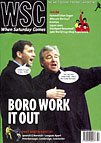 Maison Urwin explains why Colchester fans hate George Burley but loved the Conference
Maison Urwin explains why Colchester fans hate George Burley but loved the Conference
Obsession with history may be expected from an inhabitant of Britain’s oldest recorded town. Boadicea is now only evoked in the name of a pub, but on the terraces key events are still mentioned. My dad was cruel enough not to take me to see the destruction of Leeds in 1971 when, at the age of two, I was patently old enough to be in a seriously overcrowded Layer Road (more than 16,000 in a ground now limited to 7,300). However, the team we support today is defined by a pivotal relegation rather than occasional cup glory.
Colchester is a large town which has its fair share of glory-hunters who travel away from north-east Essex for their live football. The different directions they take reflect the identity crisis brought about by Colchester’s borderline location. The popularity of the Boleyn Ground on alternate weekends and the major antipathy held towards Southend by loyal Colcestrians for most of our history suggest a strongly felt identity as Essex’s premier club. Our location at the southern border of East Anglia, however, places us in the curious position of being part of a region which is alien to the rest of our fellow county-folk.
The successes of Ipswich in the late Seventies drew a proportion of potential Us fans to Portman Road and, to our dismay, Ipswich’s stay outside the top flight has ended (though surely only for a season or two). Southend remained the focus of Layer Road ill-feeling, though, until a mid-Nineties event which incensed the faithful and cemented Ipswich’s position as our demons for a long time to come.
George Burley, a man whose name is mud in these parts, walked out on Christmas Eve of his first season and into the position he had always coveted. Nobody doubted that one day he would go, but most thought he would have the decency to put in a respectable stint first. Ipswich’s status as new darlings of the cooing media is in painful contrast to the truth that we know.
Despite this setback, we are a division higher and into our ninth season back in the Football League. Local support is boosted to some extent by elements from populations resident at the University of Essex and the large nearby garrison. But neither these additions to Colchester’s population nor the football boom of the early 1990s can fully account for the doubling of attendances from the sub-2,000 crowds of the late Seventies and early Eighties.
For that we can thank relegation from the league in May 1990 and our subsequent rejuvenation in the Conference. We had been dragged to the bottom of the Fourth Division by the ineptitude of then chairman Jonathan Crisp and the ex-supermarket manager he installed as team manager, Roger Brown. On reflection, after two years of utterly abysmal football, the only way up was down.
What can one say about our two years in what is often portrayed as the wilderness? We had a ball. Ian Atkins took us to within a couple of points of the title in our first season, but the best was still to come when Roy McDonough, as player-manager, had the job of driving a professional but financially deprived club to the top of a highly competitive league in which the considerably richer Wycombe Wanderers had become a force under Martin O’Neill. The double was sealed on our first visit to Wembley in the FA Trophy final to herald a new beginning and a decade in which we would return to Wembley twice more.
During the early Nineties we were entertained by the wonderful Mark Kinsella and can still barely believe how long we kept him for. Lomana Trésor Lua-Lua, unfortunately, was noticed considerably more quickly. Whether the £2.5 million from his sale will be used wisely remains to be seen. But the trough in performances since his departure has brought us to a crucial point in our Second Division existence.
We are now in our third season and, for the third time, WSC readers have us down as favourites for the wooden spoon. Since Deloitte & Touche would also have us in the bottom division of the financial Football League, it is no mean achievement that we have held our position. It is fair to say that the best we can hope to do is consolidate our current status.
Many football fans talk of their club in relation to Premiership potential but Us fans often talk of a golden era in the Conference: the regular goal-fests, the superiority felt by supporters of a full-time team, the friendly terraces and the bars open to all. There are many of us who would not want to get to the Premiership. We would not want a soulless stadium like the New Den, less than half full for league games. We do not want higher prices and we certainly do not want to have to sit down.
What Wimbledon achieved is no longer possible. Gone are the days when a determined Boadicea can defeat an invading Caesar. Those who seek glory are welcome to travel, but those who choose loyalty are satisfied with what we have. Well, most of the time.
From WSC 168 February 2001. What was happening this month